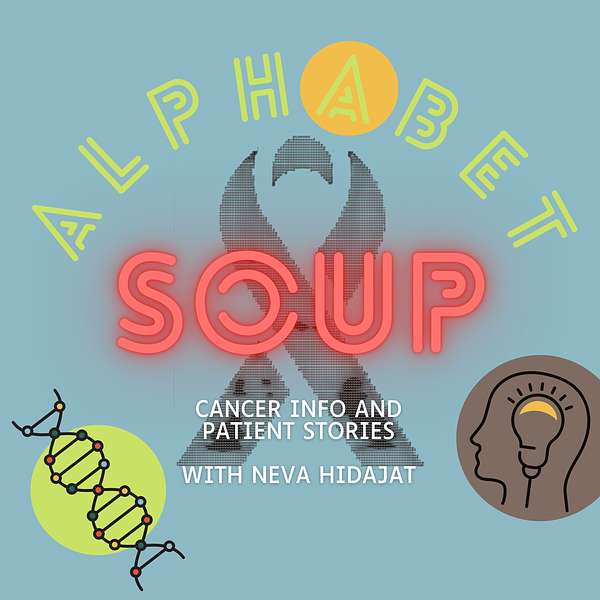
Alphabet Soup: A Mental Health & Medicine Podcast
Alphabet Soup: A Mental Health & Medicine Podcast
Ep. 33 How mRNA Vaccines Show Promise in Curing Cancer
Decades of cancer research made developing the mRNA vaccines used to combat COVID-19 possible. In turn, the pandemic opened the doors for rapid development of vaccines, which is critical for treating cancer patients. Today, Neva talks about how mRNA vaccines are extremely promising in curing the worldwide leading cause of death.
Follow Alphabet Soup on Instagram: https://www.instagram.com/alphabetsoup.podcast/?hl=en
Sources: https://www.cancer.gov/news-events/cancer-currents-blog/2022/mrna-vaccines-to-treat-cancer
https://www.cdc.gov/coronavirus/2019-ncov/vaccines/different-vaccines/mrna.html
https://immune-checkpoints.creativebiomart.net/immune-checkpoint-antibody-discovery.html?gclid=Cj0KCQiA95aRBhCsARIsAC2xvfy4T6B2qvwLTOHpRkDuuoO1DDI9j4WibE2fMwkAO0cFFwvM0k43m2YaAtxBEALw_wcB
Welcome to Alphabet Soup, the theme we are exploring this season is cancer. So today, I’m talking about how mRNA vaccines, show promise in curing cancer with facts supported by the National Cancer Institute. So, stay tuned for more on this topic
What is mRNA and how do mRNA vaccines work? Firstly, mRNA stands for messenger RNA, which is a single strand of nucleotide bases that code for certain genetic sequences used to create certain proteins. In other words, mRNA is the messenger that delivers instructions for how to build different types of proteins. To make effective vaccines, scientists engineer stable forms of mRNA that carry the instructions for how to make a harmful but stable protein and injects these instructions into your body in a small dose. Ideally, your cells will create the protein, and then your body will recognize that it is harmful. This recognition triggers the body’s immune system response. Meaning that the body will now work to get rid of the protein. Like how your immune system will work to get over a bad cold. What is great about this process, is that by feeding your cells the instructions for the bad protein and forcing your immune system to work to eradicate it, you are teaching your cells how to beat the bad protein, and the cells will remember this and be able to fight more efficiently if it does show up again. When we learned long division when we were younger, at first the foreign symbols made no sense, but once the teacher taught us how to tackle the problem, it got easier. mRNA vaccines are the same idea.
So how can these vaccines be used to treat cancer? The idea is that with an mRNA vaccine, your body will learn to recognize that harmful protein if it is present in tumor cells. Then, this will trigger an immune system response that targets the tumor cells and shuts them down. Additionally, cancer researchers have been developing a highly personalized cancer vaccine in which specific mRNA is manufactured for an individual based on the molecular features of their tumors. What trials and research has shown, is that it takes about 1 to 2 months after tissue samples are collected from a patient, to produce a personalized mRNA cancer vaccine. This is a start but speeding up the process is critical for the method to be able to save those in critical condition. Dr. Mathias Vormehr, codirector of Cancer Vaccines at BioNTech says, “A highly individualized vaccine combination must be designed and produced within weeks of taking a tumor biopsy.” However, the promise of this is unmistakable, and doctors and researchers are working to develop clinical trials that will test personalized mRNA vaccines further. A trial conducted by Dr. Julie Bauman at the university of Arizona Cancer Center has already shown promise for using a personalized mRNA vaccine along with an immune checkpoint inhibitor to treat patients with head and neck cancer. Among the first 10 participants of the trial, 2 patients had a complete response, meaning their tumors disappeared and 5 had their tumors shrink. Because of the success of the first 10 patients, the clinical trial has expanded to include 40 patients with head and neck cancer, and Dr. Bauman is, in her words, “cautiously optimistic”.
So, we know that rapid production is critical for personalized vaccines to be applicable to every patient. And the development of a COVID-19 vaccine was another medical event where time was of the essence. Weirdly enough, we owe the breakthrough of the COVID vaccines to cancer research. The pandemic created an unexpected opportunity to discover that mRNA vaccines can be rapidly developed. Dr. Robert Meehan, senior director of clinical development at Moderna, said “There’s a lot of synergy between research on immunotherapy and mRNA cancer vaccines.” And I guess this goes to show how open doors can appear in front of us. Historically, developing vaccines has taken 10-15 years. However, the pandemic paved the way for safe and effective vaccines to be developed in less than a year. This is groundbreaking and shows great promise for developing a cure to cancer, possibly in the very near future.
That’s it for today’s episode. And hey, share this episode with someone, it’s a simple way to spread key information about the recent developments of cancer care, and could be significant to be aware of. Thanks for listening to alphabet soup, and I hope you tune in to next week’s episode, where we’ll meet leukemia survivor Lisa King, and hear about her story.